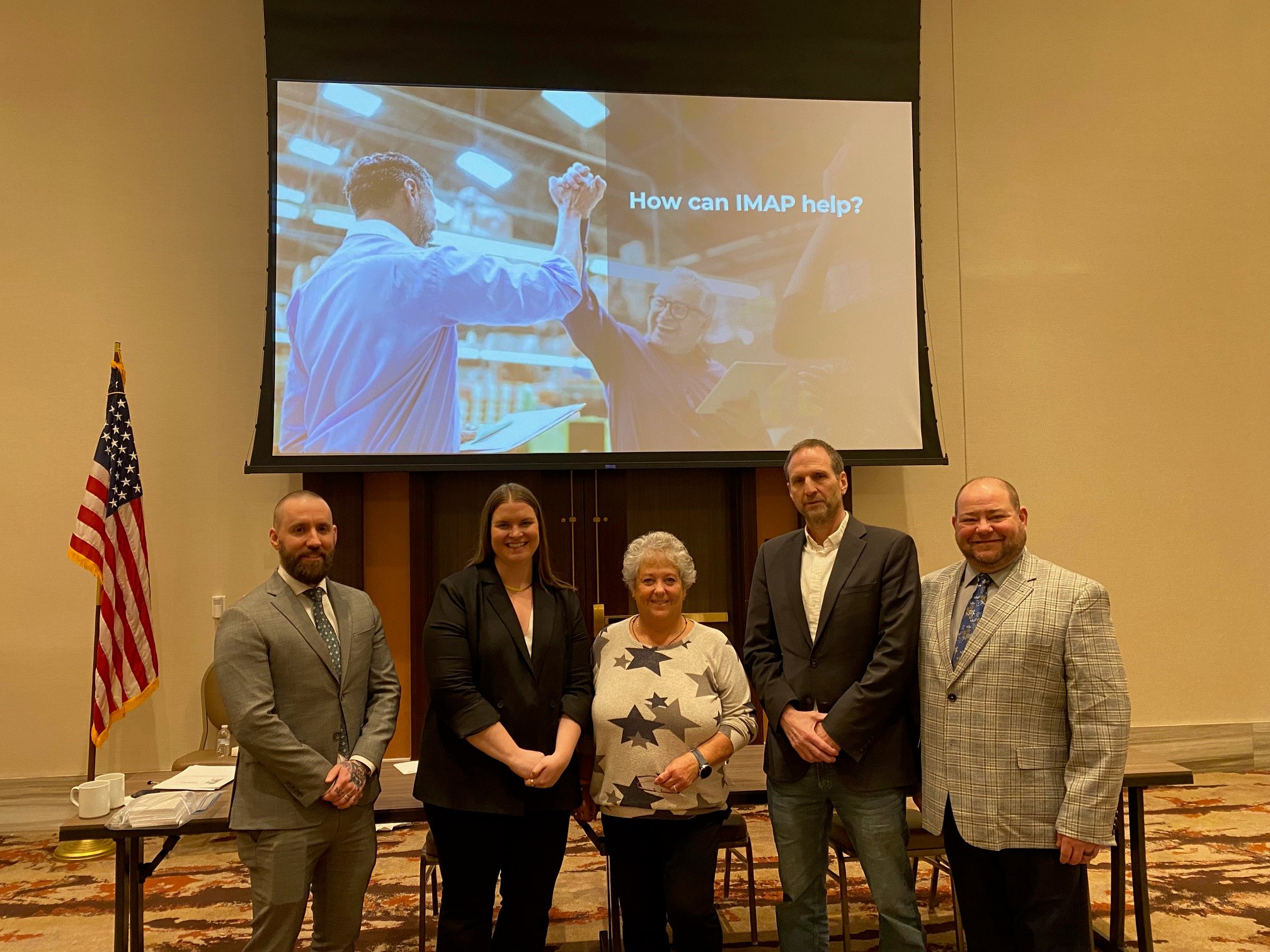
Representatives from the Insulators Members Assistance Program, in cooperation with the Mechanical Insulators Labor Management Cooperative Fund, provided mental health awareness training at the Insulation Industry International Apprenticeship and Training Fund’s Joint Apprenticeship Conference (JAC) in Orlando, Fla.
The 49th annual JAC, held in conjunction with the IIIATF’s Master Apprenticeship Competition, brings together Apprentice Coordinators and Trainers, plus the top apprentices enrolled in Insulators Union registered apprenticeship training programs from the U.S. and Canada.
With over 5,000 apprentices in ever-changing energy conservation and environmental topics, it is vital to have the latest technologies and strategies to address 21st-century Mechanical Insulation needs.
The IIIATF’s training programs not only embrace the education of complex skill training, but also address the soft skills training to develop the complete world-class Mechanical Insulator.
One of the soft skills addressed is the mental well-being of the workforce, as the Insulators Union is serious about assisting its members in their time of need.
In the Mechanical Insulation industry, it is important for Mechanical Insulators to have a clear head to allow a worker to focus on the task at hand. People face many internal challenges, but that does not mean they are inferior. Instead, their internal challenges should be addressed so they can work safely and effectively.

When a Mechanical Insulator is 150 feet in the air on a pipe rack, the mind cannot wander elsewhere. They must focus on their task. This is not only for their safety, but for the safety of others on the jobsite.
It is why so much effort has gone into creating the procedures for the now-normalized drug and alcohol screenings – to ensure a construction worker’s mind is not affected by a foreign substance.
Mental well-being is just as important, if not even more important, because it cannot be identified as quickly with a syncretic chemical test for screening. A worker struggling to process life issues may not think clearly and may unintentionally create an unsafe work environment for themselves and others.
By placing an emphasis on mental health, it shows the International, IIIATF and LMCT understand and support the affiliated members in all aspects of their lives.
To address mental health issues, the Insulators Members Assistance Program (IMAP) was developed just over a year ago by combining the power of two organizations – Perspectives and YouTurn.
“We are thrilled to work with Perspectives and the Insulators Union,” said Richard Jones, YouTurn Chief Clinic Officer. “The Insulators Union is willing to take action and invest in their people. That’s refreshing.”
In July, IMAP representatives introduced the program to the JAC attendees.
“For decades, the IIIATF has given our Local Union Apprentice Coordinators, as well as Trainers, the skill set and tools to train the future of our industry – the apprentices,” said John Stahl, IIIATF Fund Administrator. “However, there is one subject matter that we have not had the knowledge, or quite frankly, the know-how, to prepare our Coordinators and Trainers for addressing the mental health of our apprentices. Unfortunately, most, if not all, of us, have had an unfortunate moment in life where we wish that we were better prepared to address this matter.
“We are blessed that the International, along with the assistance of the LMCT, brought IMAP to the 2024 JATC Conference to give our Apprentice Coordinators and Trainers the much-needed knowledge and direction on how to handle this terrible disease,” he added.
While the program will assist the members in new ways, its effectiveness will be affected by the outreach effort (getting the information out to the members).
“IMAP outreach is essential from all levels of this partnership: International Apprenticeship Coordinators and key individuals,” Gina Higgin, Perspectives Executive Account Manager, said. “Success will happen using as many modes of communication as possible, including technology, paper (hard copies) and sharing individual experience.”

An essential aspect of IMAP is the ability to have 100 percent confidentiality, meaning nobody will know who is reaching out – not the union leader, contractor or coworkers.
This is a critical element of the IMAP, ensuring that members can seek help without fear of judgment or repercussions.
IMAP is designed to assist the members of the International Association of Heat and Frost Insulators and Allied Workers with a unique concept of mental well-being. The program is multifaceted and complex, addressing many personal issues affecting the member and their family. It differs from other healthcare-related needs because many hidden attributes and stigmas exist.
The members must be made aware of such assistance or outreach with a level of attention that offers some not-so-normal conversations, understanding and compassion. Most who need help are reluctant to realize it, which must be addressed.
“Our training professionals have the skill and techniques to deliver this important information to their apprentices,” said LMCT Executive Director Pete Ielmini. “Today’s apprentices are the workforce of tomorrow, and it is about time that mental awareness and assistance is brought to the forefront of apprenticeship training.”
It is not a coincidence that a safe workplace is productive because workers are prepared for the challenges they face several times a day, whether by applying the safety procedures they learned or the proper product application for a particular task. It does not matter that their training has taught them to work smarter, not harder. Empowering personnel to have the knowledge to resolve physical or psychological issues will inherently increase performance and create safe work environments.
Having construction personnel think more than five minutes ahead of themselves is a factor that the apprenticeship program can implement that will affect the bottom line. That is the preferred culture. It is a fact that investment in training and educating the workforce will reduce injuries and increase performance.
Training sessions are now being offered to apprenticeship leaders from their respective Conferences.
This training will address the communication skills needed to connect effectively with affiliated members who need to be made aware of available services, not only for themselves but to offer assistance to someone else. This also extends to the family members as well.

A host of stigmas and social barriers have to be addressed, and training from professionals is required.
This type of training does not make our leaders health professionals or psychological experts; rather, it is meant to help them to communicate to their members that professional assistance is only a phone call or a click away.
Higgin and Jones facilitated the IMAP presentation at the JAC. They presented a dynamic blend of mental health well-being topics from which the apprenticeship community will benefit. The presentation included the following, but not limited to:
- IMAP is a place to start; a comprehensive resource for Insulator Union members and leaders.
- Understanding how we communicate and learn how to best communicate with others through a behavioral model.
- Understanding mental health/substance use disorder (SUD) and its impact.
- Awareness of the risk factors within the trades.
- How to approach difficult situations and provide support, have a productive conversation and provide resources.
- Highlight the steps to take even though there are challenges.
- Communication skills.
“The event was successful because the apprenticeship leaders stepped up and engaged with many discussions,” said Higgin. “The participants learned a process and something about themselves as individuals and leaders. The length of this program may seem like a lot of time; however, it was packed with energy and collaboration. The time flew by, and participants seemed appreciative of what it offered and were engaged in the process.”
The common thread among all these topics is primarily the ability to communicate.
All the JAC attendees possess this ability but must be reminded how it works.
The construction industry differs from manufacturing in that we do not produce a product; we provide a service – a service provided by people. Happy and content people are more productive and safer to work with.
“I thank LMCT Director Pete Ielmini and the staff of the Perspectives and You turn for the training session,” added Stahl.


Comments